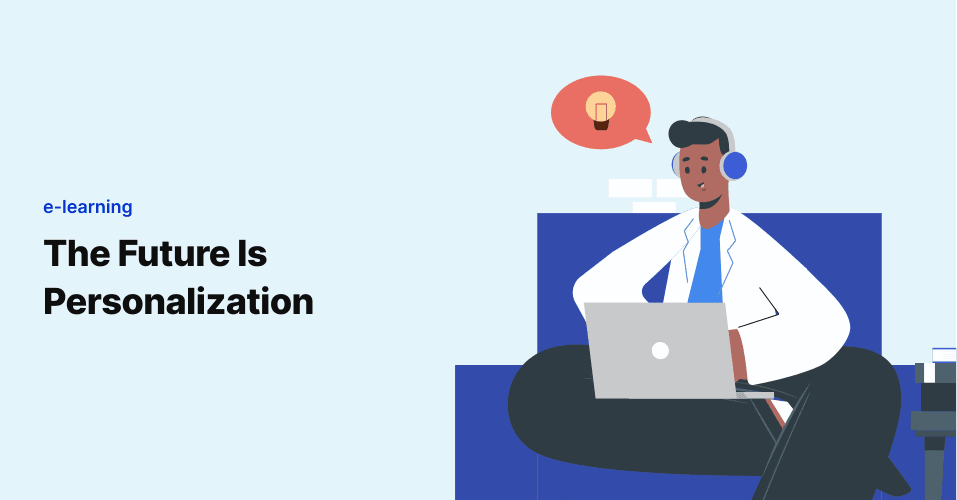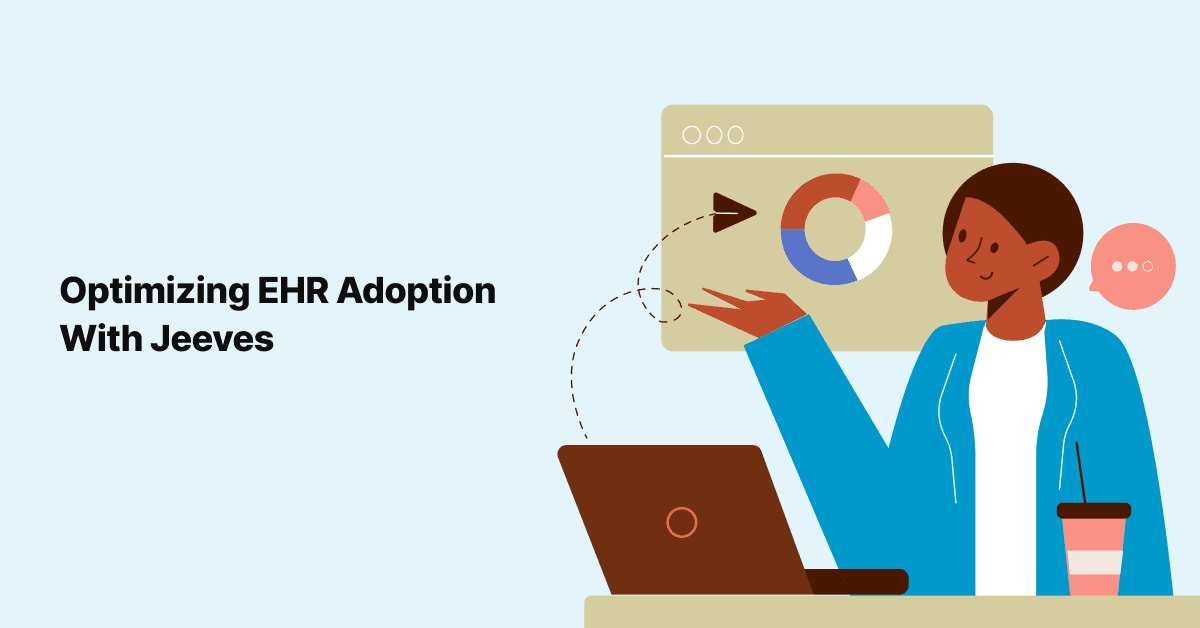
Maximizing Your Investment Through Microlearning and Video
Historically, EHR training at hospitals has comprised of:
- Classroom Training
- Emailed Tip Sheets
However, these …

A dynamic landscape has become the reality of healthcare today.
The biggest question is - How to keep up?
Training and education can be the short answer!
Training and education play a critical role in keeping healthcare professionals up-to-date with the latest advancements and ensuring optimal patient care. However, traditional training methods often fall short of addressing the diverse needs and preferences of learners. That’s where personalization comes in. Personalization is revolutionizing the future of training and education in healthcare, empowering physicians and nurses to enhance their skills and knowledge while driving improved patient outcomes.
Let’s learn more about personalization in training and education with this blog.
What this blog covers:
Traditional training methods have long been the backbone of healthcare education. They have their merits, providing a foundation of knowledge for learners. However, they also present several challenges that hinder effective and engaging learning experiences.
Training and education in healthcare are undergoing a transformative shift with the advent of personalization. This innovative approach addresses the limitations of traditional methods, revolutionizing the learning experience for healthcare professionals. By harnessing cutting-edge technologies, data analytics, and adaptive learning platforms, personalization empowers learners to optimize their engagement, knowledge retention, and overall competency.
Here’s how it helps:
The application of adaptive learning in training and education in healthcare has several significant benefits. First and foremost, it optimizes the use of valuable training time by allowing professionals to focus on areas that require further development. Instead of spending unnecessary hours reviewing content they already know well, adaptive learning identifies knowledge gaps and delivers customized learning paths tailored to the specific needs of each learner. This targeted approach saves time and resources, maximizing the efficiency and effectiveness of training efforts.
Furthermore, adaptive learning enhances engagement and knowledge retention among healthcare professionals. By delivering content in a personalized and interactive manner, adaptive learning platforms create a more immersive and engaging learning experience. Through the integration of multimedia elements, simulations, case studies, and interactive quizzes, adaptive learning keeps learners actively involved and encourages them to apply their knowledge to realistic healthcare scenarios. This active participation significantly improves knowledge retention, as learners are more likely to remember and effectively apply what they have learned in their day-to-day practice.
Adaptive learning also fosters a culture of continuous learning and professional growth in the healthcare industry. By providing personalized training opportunities that align with individual career goals and development needs, adaptive learning platforms empower healthcare professionals to take ownership of their learning journeys. This self-directed approach not only enhances professional competence but also contributes to improved patient outcomes, as professionals continuously update their knowledge and skills to meet the evolving demands of the healthcare field.
The future of training and education in healthcare relies on the widespread adoption of adaptive learning methodologies. As healthcare organizations increasingly recognize the importance of personalized training, adaptive learning platforms are becoming essential tools for delivering tailored and effective learning experiences. By harnessing the power of adaptive learning, healthcare professionals can continuously expand their knowledge, refine their skills, and provide the highest standard of care to patients.
In conclusion, adaptive learning is a catalyst for personalized training and education in healthcare. By leveraging data-driven approaches and advanced technologies, adaptive learning platforms empower healthcare professionals to engage in targeted, immersive, and continuously evolving learning experiences. As the industry embraces adaptive learning, the future of training and education in healthcare holds the promise of improved professional competence, enhanced patient care outcomes, and a culture of lifelong learning.
The test-out option provides a pathway for learners to demonstrate their competency. Instead of forcing these individuals to go through lengthy and repetitive courses, the test-out option allows them to showcase their existing knowledge and skills, ultimately saving valuable time and resources.
One of the primary advantages of the test-out option is its ability to tailor the learning experience to the specific needs of each individual. Proficient learners can prove their competence through assessments or evaluations, which assess their understanding and mastery of the subject matter. By doing so, they can fast-track their training and focus on areas that truly require their attention and development.
Implementing the test-out option in healthcare training and education offers several benefits. Firstly, it recognizes and respects the proficiency of healthcare professionals, allowing them to remain fully engaged in their daily work responsibilities. Instead of diverting their attention to repetitive training, proficient learners can continue contributing to patient care and maintaining high levels of productivity.
Furthermore, the test-out option promotes a sense of empowerment among healthcare professionals. It acknowledges their expertise and provides them with the autonomy to choose the learning path that suits them best. This level of personalization not only increases motivation but also encourages self-directed learning, as proficient learners take control of their training and focus on areas that align with their individual goals and aspirations.
From an organizational perspective, implementing the test-out option optimizes resource allocation and enhances the efficiency of training programs. By identifying proficient learners early on and offering them the opportunity to test out, healthcare organizations can allocate their training resources more effectively, ensuring that valuable resources are directed toward learners who genuinely need additional support.
Additionally, the test-out option contributes to a culture of continuous improvement in healthcare. By streamlining the training process for proficient learners, organizations can encourage a focus on lifelong learning and professional development. Not just this, the proficient learners could help the ones that need additional training and support through peer learning.
Flexibility and accessibility are essential components of personalized learning in healthcare. Professionals often face time constraints due to their demanding clinical responsibilities. Therefore, providing on-demand access to learning resources allows them to engage in training at their convenience, fitting it seamlessly into their busy schedules. Whether through mobile applications, online platforms, or blended learning approaches, flexibility ensures that training remains accessible and adaptable to the individual needs of healthcare professionals.
Personalized learning in healthcare also nurtures a culture of continuous improvement. It encourages professionals to take ownership of their learning journey, set personal goals, and actively seek opportunities for growth. By fostering a mindset of lifelong learning, we equip healthcare professionals with the tools they need to stay up-to-date with the latest advancements, deliver high-quality care, and make a meaningful impact in their field.
In conclusion, creating a future of personalized learning in healthcare training and education is essential to meet the evolving needs of healthcare professionals. By recognizing their individuality, leveraging technology, and providing flexible learning pathways, we can empower professionals to thrive in their careers while enhancing patient outcomes. Embracing personalized learning ensures that training and education in healthcare are tailored, engaging, and effective, paving the way for a future where every learner can reach their full potential.
Are you looking for a tool that can create and deliver personalized training content to your EHR users?
You must certainly check out Jeeves!
Jeeves is a Just-in-Time AI training platform that can help your healthcare professionals in their personalized learning journey.
Join over 3,200 subscribers and keep up-to-date with the latest innovations & best practices in Healthcare IT.

Historically, EHR training at hospitals has comprised of:
However, these …

Over the past few years, the healthcare industry has seen a lot of development in terms of technology. …

The implementation of an EHR is certainly a breakthrough for your health system; however, clinicians are still …